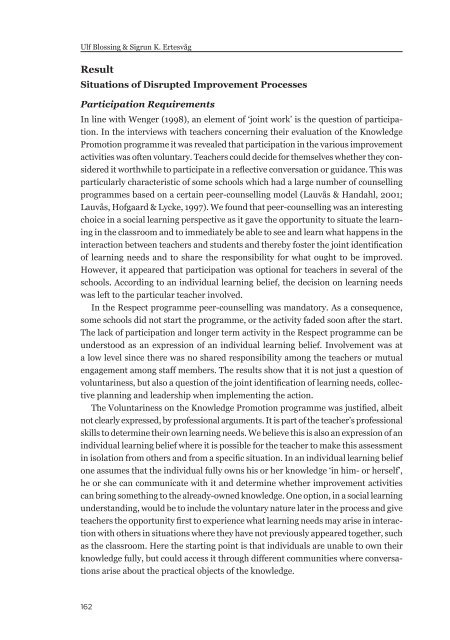Download issue - Umeå universitet
Download issue - Umeå universitet
Download issue - Umeå universitet
You also want an ePaper? Increase the reach of your titles
YUMPU automatically turns print PDFs into web optimized ePapers that Google loves.
Ulf Blossing & Sigrun K. Ertesvåg<br />
Result<br />
Situations of Disrupted Improvement Processes<br />
Participation Requirements<br />
In line with Wenger (1998), an element of ‘joint work’ is the question of participation.<br />
In the interviews with teachers concerning their evaluation of the Knowledge<br />
Promotion programme it was revealed that participation in the various improvement<br />
activities was often voluntary. Teachers could decide for themselves whether they considered<br />
it worthwhile to participate in a reflective conversation or guidance. This was<br />
particularly characteristic of some schools which had a large number of counselling<br />
programmes based on a certain peer-counselling model (Lauvås & Handahl, 2001;<br />
Lauvås, Hofgaard & Lycke, 1997). We found that peer-counselling was an interesting<br />
choice in a social learning perspective as it gave the opportunity to situate the learning<br />
in the classroom and to immediately be able to see and learn what happens in the<br />
interaction between teachers and students and thereby foster the joint identification<br />
of learning needs and to share the responsibility for what ought to be improved.<br />
However, it appeared that participation was optional for teachers in several of the<br />
schools. According to an individual learning belief, the decision on learning needs<br />
was left to the particular teacher involved.<br />
In the Respect programme peer-counselling was mandatory. As a consequence,<br />
some schools did not start the programme, or the activity faded soon after the start.<br />
The lack of participation and longer term activity in the Respect programme can be<br />
understood as an expression of an individual learning belief. Involvement was at<br />
a low level since there was no shared responsibility among the teachers or mutual<br />
engagement among staff members. The results show that it is not just a question of<br />
voluntariness, but also a question of the joint identification of learning needs, collective<br />
planning and leadership when implementing the action.<br />
The Voluntariness on the Knowledge Promotion programme was justified, albeit<br />
not clearly expressed, by professional arguments. It is part of the teacher’s professional<br />
skills to determine their own learning needs. We believe this is also an expression of an<br />
individual learning belief where it is possible for the teacher to make this assessment<br />
in isolation from others and from a specific situation. In an individual learning belief<br />
one assumes that the individual fully owns his or her knowledge ‘in him- or herself’,<br />
he or she can communicate with it and determine whether improvement activities<br />
can bring something to the already-owned knowledge. One option, in a social learning<br />
understanding, would be to include the voluntary nature later in the process and give<br />
teachers the opportunity first to experience what learning needs may arise in interaction<br />
with others in situations where they have not previously appeared together, such<br />
as the classroom. Here the starting point is that individuals are unable to own their<br />
knowledge fully, but could access it through different communities where conversations<br />
arise about the practical objects of the knowledge.<br />
162

















